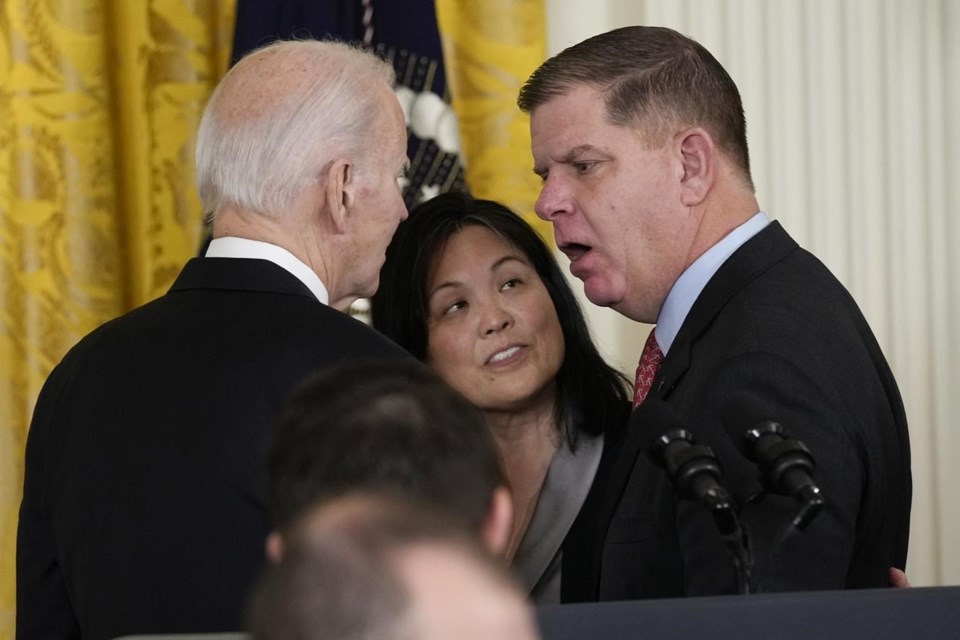Marty Walsh wasn't a man in a hurry to leave the Biden administration.
Less than halfway through the president's term, Walsh was in a comfortable spot in the Cabinet as labor secretary. Then he got a call about an interesting opportunity: running the NHL Players' Association.
The former mayor of Boston and longtime Bruins fan was intrigued and earlier this year accepted the role as executive director. Now three months in, Walsh is trying to get to know players and what they care about most, learning about everything from the Arizona Coyotes' arena situation to the salary cap and future international competition.
“This job is more like being the mayor,” Walsh said in a wide-ranging interview with The Associated Press during the Stanley Cup Final in Las Vegas. “You wake up in the morning, you’re planning on a smooth day and there’s an issue that pops, and that’s the issue of the moment. And then when that issue’s over, there’s another issue that comes right behind it. And if there’s a celebration on anything, that celebration’s short-lived because you’re on to the next issue.”
With the current collective bargaining agreement in place through the 2025-26 season, the most pressing issue concerns the Coyotes, set to go into a second season in a 5,000-seat rink on Arizona State's campus after a referendum for a new arena in Tempe failed.
Walsh has met more with Arizona's players than anyone else among the nearly 200 members he has spoken to so far.
“These are National Hockey League players playing in a college arena,” Walsh said. “Players that are heading into the prime of their career now playing in this arena for a couple seasons — it’s just not right. It’s not good for the game.”
When Walsh speaks to players, he finds out what they think is good or not so good for the game. Many, like Connor McDavid, prioritize returning to the Olympics after a lengthy absence and getting a World Cup of Hockey on the schedule, while others are more concerned with the cap going up and keeping escrow payments down.
Several months after helping the U.S. avert a nationwide rail strike, this job hearkens back to the days when Walsh was president of the Laborers’ Union Local 223 in Massachusetts. With players aged 18-38 in various stages of their careers, he said the NHLPA membership is diverse in what it cares about, just like any other workplace.
“One thing I’ve learned quickly is that this truly is a union because every player has a different concern,” Walsh said. “And I think it’s important for me to get to know the membership so I can represent them the best I can, understanding the challenges they have.”
Walsh, 56, also has gotten to know Commissioner Gary Bettman since taking over in March. They attended an event together at the Canadian Embassy in Washington in April and have met several times to discuss the cap, the Coyotes and more.
"To me, the vital signs seem good," Bettman told the AP recently. “We’re getting better acquainted. I like him. I respect him. I think he’s smart. I think he’s going to be good for the players, and I look forward to working with him.”
Walsh called it a “very cordial working relationship,” while acknowledging there will be disagreements ahead “that put us on two different sides of a fence — and we will have to deal with that when the time comes.” Collective bargaining talks in the coming years almost certainly will bring that conflict.
Kevin Shattenkirk, a veteran defenseman who was on the search committee, said Walsh was engaging and commanding right away and gave out his cellphone number to players to call any time after his first interview.
“Part of his pitch was that he was going to be readily available to players at any moment — any time that we needed him,” Shattenkirk said Sunday. “With his experience in working in labor unions, I think he knows how important that is. It’s important for the head of it to be accessible and also at the same time to be strong and powerful and know which way he’s leading his organization.”
For now, Walsh is trying to lead the way in preparing players for life after hockey and growing the game beyond the nearly $6 billion in revenue. He watches football, basketball and baseball differently since shifting from politics to sports, thinking about what other leagues have done and how it might apply to the NHL.
Walsh is a fan of increasing interest in Sweden and other places in Europe with games there and wonders about opportunities for hockey in Latin American countries and among underserved populations in North America.
“We have teams like the Dallas Stars and the Coyotes and even the (Florida) Panthers to some degree: large Latino populations,” Walsh said. "You think of Boston — are we tapping into Latino population in Boston, New York, Chicago, places like that?”
Just getting a chance to tackle tasks like that excites Walsh, who said he still has a very strong, close friendship with Joe Biden. The president, when Walsh left in February, called him “one tough union chief” and a model for future labor secretaries.
This is just a different challenge, one that Walsh feels his entire career has prepared him for.
“There’s not many opportunities that probably could have come on my plate that I would’ve been like, ’Oh, this is perfect,'” he said. “This is kind of my whole life coming full circle: labor movement, running a union, opportunities to grow the game, to be progressive in thinking as to how do we grow the game, how do we strengthen the union.”
___
AP NHL: https://apnews.com/hub/nhl and https://twitter.com/AP_Sports
Stephen Whyno, The Associated Press



